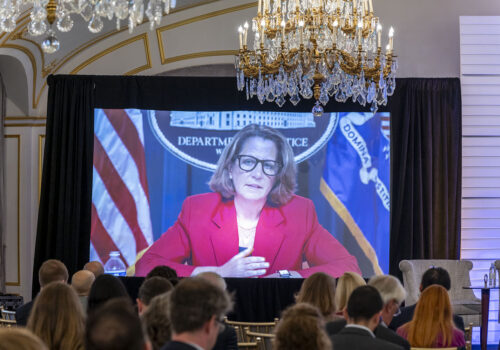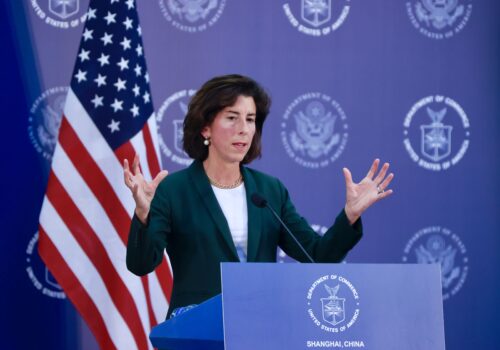The threat environment around this year’s US elections is “a more complex and diverse environment than I frankly have ever seen before,” said US Deputy Attorney General Lisa Monaco.
Monaco, in speaking at the Transatlantic Forum on GeoEconomics hosted by the Atlantic Council’s GeoEconomics Center and Atlantik-Brücke, attributed that rise in complexity to the fact that “more threat actors” are “getting into the game, particularly when it comes to malign foreign influence.”
While Russia is the “dominant and predominant actor” involved, Monaco explained, Iran is accelerating its efforts to influence the presidential election, and China is leading efforts to influence down-ballot races.
While these efforts differ slightly, they’re all similar in their aim to “sow discord, sow distrust in our election system, and undermine confidence in our democratic process,” she warned, adding that those efforts are becoming more fueled by the polarized environment in the United States.
The Department of Justice (DOJ), she said, is working to “investigate, expose, and disrupt” wherever possible. Earlier this month, the department seized more than thirty online domains run by Russian companies, including the Social Design Agency, which was using artificial intelligence (AI) to spread false narratives and ultimately interfere with US elections. Monaco said that the DOJ has also seen Iran using AI in its efforts, sometimes using the war in Gaza “almost like kerosene,” to fuel discord.
Below are more highlights from the discussion, moderated by Stephanie Flanders of Bloomberg Economics, in which Monaco also touched upon the DOJ’s work to stop adversaries from flouting laws, the use of sanctions, and the connection between national security and economics.
Domestic threats
- Ahead of the November elections, Monaco noted, the DOJ has filed lawsuits around the country, in locations “where we want to make sure that states are living up to their responsibilities to ensure equal and clear and fair access to election and polling places.”
- But beyond that, she has concerns about what an “unprecedented rise” in threats to public officials and election workers means for election security. She said the rise in threats of violence, and actual violence, has come against everyone “from elected or appointed secretaries of state to volunteers” at polling sites. The DOJ, she said, has brought hundreds of cases against people who lodge such threats.
- “There is no place for political violence,” she said, adding that the United States has seen the danger such violence poses, recently in the form of two assassination attempts on former US President Donald Trump. This week, the DOJ brought attempted assassination charges against Ryan Routh for the second attempt.
- “We are holding accountable those who would undertake threats to our democracy. And that should be a very clear message to anybody who would contemplate doing so in the future,” she said.
Learn more about the Transatlantic Forum on GeoEconomics
On the case
- The DOJ and TikTok are currently in court over a law, passed by the US Congress earlier this year, that requires the social media app’s parent company ByteDance to divest ownership of TikTok or face a ban in the United States. “This is not a ban [on] TikTok or any other application. It doesn’t censor American speech,” she argued. “What it is responding to is a real and documented national security threat posed by nation-state adversaries.”
- She pointed to declassified intelligence that she said shows TikTok and ByteDance have acted in response to demands by the People’s Republic of China to censor content.
- “The central purpose of the law is to break the ties that bind TikTok to Beijing,” she said.
Rules of the road
- Monaco argued that the DOJ wants the United States to “be a leader and an innovator” on AI. “But we have to do so attentive to the risks posed . . . especially risks posed [by] deliberate misuse,” she said.
- “This is a brave new world,” she said, “but the law applies” when it comes to corporate criminal enforcement and the misuse of AI. She added, for example, that price fixing with AI is still price fixing. “We’re going to treat it as such.”
- “If AI is being deliberately misused and abused within a company to perpetrate a particular crime, to make it more impactful [and] more serious, we will seek enhanced sentences,” she said.
Keep away
- Monaco dove into the DOJ and Department of Commerce’s Disruptive Technology Strike Force, which aims to stop adversaries from acquiring US technology to advance their authoritarian goals. Recently, the strike force announced criminal charges in five cases involving technologies such as unmanned aerial vehicle electronics and laser welding machines.
- “We are going after adversaries who are trying”—via criminal activities such as export control violations, smuggling, and theft of trade secrets—“to siphon off our most critical technologies to use [them] against us and to fuel their own economic and national security and military rise,” she explained.
Punishing the norm busters
- While there is debate on whether the United States is overusing sanctions, Monaco called sanctions a “critical ingredient” in forging an international response to Russia’s full-scale invasion of Ukraine.
- The “common currency” of rights-respecting nations, Monaco explained, “is upholding the rule of law; it is pushing back against the norms-violating behavior that we see most brutally and vividly in Russia’s invasion of Ukraine.”
- “We need to be enforcing those sanctions to the best of our ability,” she said. She added that the sanctions will have to “withstand a test” in the form of challenges lodged by not only Russian oligarchs but also by others, including people in the West. “But we are up to that challenge,” she said.
- Monaco also discussed the DOJ’s Task Force KleptoCapture, which aims to enforce sanctions on Russian oligarchs. “We’re really trying to go after those who are fueling [Russian President Vladimir Putin’s] war machine and thereby . . . really isolate what is kind of norm-busting behavior by Putin.”
- For that and other initiatives, she said, the United States is working closely with its international partners. “We are much stronger when we are working together to really close off these avenues, these dark spaces,” she said. “But also we need cooperation from the private sector.”
- “We are going to take disruptive action wherever we can . . . going after the whole ecosystem that is really contributing to destabilizing activities around the world,” she said.
Katherine Walla is an associate director of editorial at the Atlantic Council.
Watch the full event
Further reading
Thu, Sep 26, 2024
How Russia, China, and Iran are working to sow distrust in US elections, according to US Deputy Attorney General Lisa Monaco
Transcript By
At the Transatlantic Forum, Monaco touched upon the DOJ’s work to stop adversaries from flouting laws, the use of sanctions, and the connection between national security and economics.
Thu, Sep 26, 2024
China is ‘aiding and abetting the Russian war machine,’ says US Ambassador to China Nicholas Burns
New Atlanticist By
At the Transatlantic Forum on GeoEconomics in New York, the US ambassador spoke about Beijing’s ties with Moscow and about how the United States is responding to Chinese manufacturing overcapacity.
Wed, Sep 25, 2024
What the next administration should do to ensure US economic and national security
New Atlanticist By Kimberly Donovan, Maia Nikoladze
The next administration must protect sensitive US technology, drive the energy transition, and safeguard the global financial system.
Image: US Deputy Attorney General Lisa Monaco spoke at the Atlantic Council's Transatlantic Forum on GeoEconomics on September 26, 2024.




